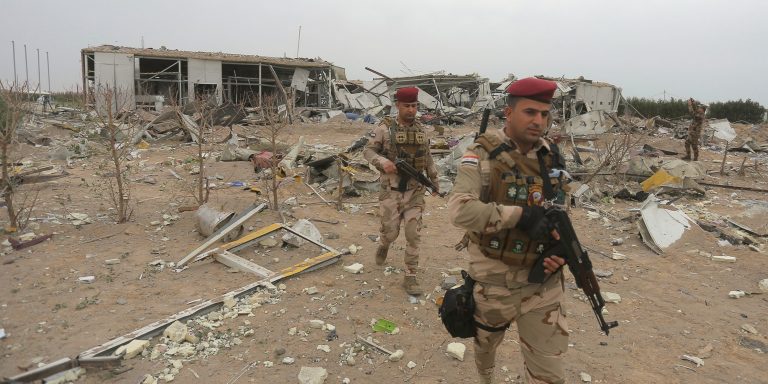INTELBRIEF
March 18, 2020
IntelBrief: Iran-U.S. Tensions Escalate Against Backdrop of COVID-19 Spread

- Lethal attacks on U.S. troops by Iran-backed Iraqi militias in March 2020 demonstrate that Iran continues to retaliate for the January U.S. killing of top Iranian commander Qasem Soleimani.
- The continued attacks suggest that Iran, contrary to Trump administration claims, is not deterred by the Soleimani killing or the U.S. troop buildup in the Persian Gulf.
- The renewal of hostilities in Iraq increases the likelihood that Iraqi leaders will be compelled to ask U.S. troops to leave Iraq.
- For U.S. policy, the renewal of U.S.-Iran hostilities in Iraq is further complicated by the coronavirus challenge, which has largely consumed the Trump administration since late February 2020.
.
The restraint by the United States and Iran since Iran’s January 8, 2020 missile retaliation in the response to the U.S. strike that killed Islamic Revolutionary Guard Corps –Qods Force (IRGC-QF) commander Qasem Soleimani appears to be ending. During February-early March, Iran’s Shia militia allies in Iraq conducted occasional attacks on facilities used by U.S. military personnel and on the U.S. Embassy in Iraq, causing damage, including to minor parts of the U.S. Embassy in Baghdad. But the strikes did not kill any American personnel and therefore did not cross the Trump administration’s precipice for requiring U.S. retaliation. Still, the continuation of militia attacks clearly contradicted Trump administration assertions that the Soleimani killing had ‘re-established deterrence’ against such Iran-backed actions.
On March 11, the dynamic changed again when a rocket barrage on the Camp Taji base by the Kata’ib Hezbollah militia, widely considered an Iran proxy, killed two American military personnel and a British medic serving in the U.S.-led coalition in Iraq, and wounded 14 other U.S. military personnel. Kata’ib is the same faction whose attacks on U.S.-inhabited bases in December 2019 caused the cycle of escalation that culminated in the strike on Soleimani and on his ally, Kata’ib’s then-leader Abu Mahdi Al Muhandis. On March 12, after U.S. officials determined that Kata’ib Hezbollah was responsible, U.S. manned combat aircraft struck several Katai’b weapons storage bases in and around Baghdad. Rather than be deterred by the retaliation, Kata’ib attacked the exact same base two days later, wounding two U.S. military personnel.
The potential for further U.S.-Iran escalation remains significant, but the political environment has shifted drastically since the January killing of Soleimani. Iraqi politics have remained unsettled since the Soleimani killing, with Iraq unable to form a permanent government amid deadlock between pro-Iranian factions seeking to expel U.S. troops from Iraq, and Sunni and Kurdish leaders seeking to preserve an American presence. The March 12 U.S. retaliation against Kata’ib reignited the debate- across the Iraqi political and factional Iraqi spectrum - that the United States violated Iraqi sovereignty. As such, the potential for Iraqi leaders to enforce an earlier non-binding parliamentary request for a U.S. military departure from Iraq has increased. A U.S. departure from Iraq would set back U.S.-led efforts to prevent a resurgence by the Islamic State organization at exactly the time when the group is starting to expand its operations in western Iraq and beyond. A recent U.S. special forces raid on an Islamic State hideout resulted in two U.S. deaths.
For U.S. policy, the renewal of U.S.-Iran hostilities in Iraq is further complicated by the coronavirus challenge, which has largely consumed the Trump administration since late February 2020. An escalation with Iran could stoke criticism that the Trump administration is unable to properly focus on mitigating the virus and its economic effects. This might explain why the administration chose to limit its initial retaliation on March 12 to targets within Iraq - and not strike Iran itself, despite earlier threats to hold Iran responsible for anti-U.S. attacks by Iraqi Shia militias. On March 16, further suggesting that the administration does not want Middle East conflict distracting from the virus response, the U.S. military announced it would consolidate U.S. personnel to fewer bases in Iraq - bases that are protected somewhat by advanced counter-battery weapons. Yet, the announced consolidation suggested that Iran and its allies in Iraq might be advancing, even if slowly, in their effort to expel U.S. forces from Iraq, especially as rockets continue to rain down on Iraqi and U.S. interests in Iraq.
.
For tailored research and analysis, please contact: info@thesoufancenter.org